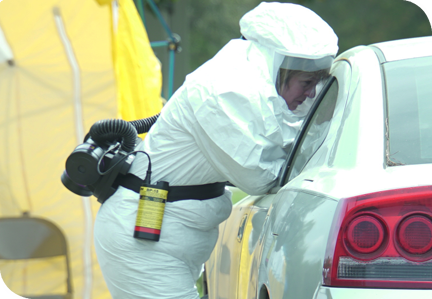
Coronavirus was a hot topic among the couple dozen regulars at the Grantville Senior Center last week before the center’s site manager, Joann Byrom, decided on Monday to close for the rest of the month.
Some of the seniors figured their small group in a rural part of the state would be insulated from the virus. Others worried about coming into contact with a couple who they heard recently tested positive and who attend their local church.
So far, none of the seniors Byrom serves have shown any of the usual COVID-19 symptoms, but the fear of an outbreak lingers.
“They want to be here and be with people,” Byrom said. “But it’s scary. I just hope it stays small.”
As of Tuesday afternoon, 146 cases of coronavirus have been confirmed in 27 Georgia counties. That number has increased steadily since diagnostic testing ramped up over the past week, according to data from the Georgia Department of Public Health. Most of the cases are clustered in metro Atlanta, though more and more have cropped up in counties elsewhere in the state like Lee, Dougherty, Lowndes, Charlton, Columbia and Richmond.
Particularly concerning for hospitals and health officials are Georgia’s most vulnerable populations: people over age 60 and those with chronic health issues. Visitation, communal dining and social outings have been tightly restricted at many senior assisted-living and nursing homes in recent days as part of efforts to keep the respiratory virus out of elderly care centers.
But already, a handful of coronavirus cases have been confirmed or presumed positive at The Retreat at Canton assisted-living facility in Canton and PruittHealth-Grandview nursing center in Athens. Tony Marshall, CEO of the Georgia Health Care Association, said those facilities have stepped up efforts to isolate residents and staff who may have come into contact with persons who tested positive for the virus.
“Our hope is we’ve taken the steps to minimize risk,” Marshall said. “But the reality is you can’t eliminate all risk. We expect to see more cases.”
Down the road from Grantville, the Heard County Senior Center has also shuttered for a week. Its director, Lou Wakeman, said the center’s Meals-on-Wheels program is still running and most of her clients have friends, family and neighbors to check on them. None of the seniors have considered being tested since they have not come down with the usual COVID-19 symptoms like fever, dry throat or coughing, Wakeman said.
“I don’t think they’re really freaked out about it or anything,” she said. “When I’ve called, they say they’re OK, and I just tell them to wash their hands and be careful.”
Impromptu visits to emergency rooms by people seeking tests for mild symptoms have strained hospitals across the state, with medical staff having to suit up in single-use protective gear each time someone arrives. Many hospitals have erected temporary outdoor screening areas to relieve the testing pressures placed on ER staff.
But the workforce demands involved in treating patients – and in a few cases health-care staff – infected with the virus have started to tax many Georgia hospitals. The nonprofit WellStar Health System has been screening, testing and treating patients among its 11 hospitals. One patient, a 67-year-old man with underlying health conditions, died last week at WellStar’s Kennestone hospital in Marietta.
In Rome, Redmond Regional Medical Center has treated five patients with coronavirus, two of whom have returned home, and as of Tuesday afternoon was awaiting test results for 20 other patients. Cases have also been confirmed outside metro Atlanta at hospitals in Cartersville and Augusta.
Supplies of gowns, gloves, masks and eyewear that can only be used once are running low as more patients arrive unannounced at hospitals for testing, said Anna Adams, vice president of government relations for the Georgia Hospital Association. She, like many medical professionals, is urging people to call their doctor, the local health department or an urgent care center before driving to the emergency room.
“The concern is that we’re going to run critically low [on supplies] and not be able to protect our health-care workforce,” Adams said. “It would really help if the public would self-quarantine.”
Gov. Brian Kemp said Tuesday state officials have started tapping into the national stockpile of medical supplies and have also ordered thousands of gowns, gloves, masks and other items.
Hospitals in rural areas could face especially challenging times as supplies dwindle, Adams said. Among them are Phoebe Putney Memorial Hospital in Albany, where eight patients have tested positive for coronavirus. Another 175 people were awaiting test results from Phoebe Putney, with 60 of those people being cared for in the hospital as of Monday, according to a news release.
“We wish we could test everyone in the community who is concerned about contracting COVID-19, but we simply don’t have the available supply of test kits to do that,” said Dr. Suresh Lakhanpal, the Physicians CEO at Phoebe Putney.
Other hospitals that have not seen any positive cases of coronavirus have begun gearing up for the increased demands on supplies that could come with patient treatment. Those hospitals preparing for cases range from Tift Regional Medical Center in Tifton to Habersham Medical Center in Demorest to the large Memorial Health in Savannah.
In Moultrie, stress levels shot through the roof for staff at Colquitt Regional Medical Center a few weeks ago as coronavirus cases swelled across the country, said the hospital’s CEO, Jim Matney. But as Colquitt’s doctors, nurses and administrators worked up a game plan, and state health officials chimed in with more guidance last week, the initial anxiety started to subside.
“We’re planning for a case. We’re planning for something to go positive,” Matney said. “But we have the checkpoints in place and we’ve set up a system to identify patients and to screen them. I think we’re going to be OK.”
